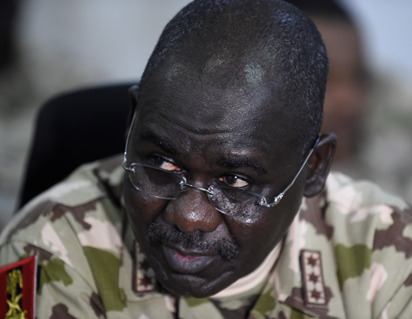By Idowu Samuel
The just concluded African Union Peace and Security Council Summit, which held at Addis Ababa, Ethiopia threw up composite and smart ideas for addressing the problem of terrorism in Africa. Indeed, the Nigerian President, Muhammadu Buhari set the tone for that in his address during the summit.

African Heads of State and leaders of International Non-Governmental Organisations (NGOs) sat comfortably and directed full gaze at President Buhari when he got up to speak.
The reason was simple. Nigeria would share with them the chilling story of terrorism anchored on activities of Boko Haram and the magic wand applied by the government to combat the scourge. Noticeably, pin drop silence greeted the President’s speech, while everyone at the conference hall listened with rapt attention.
Speaking under the theme, “Towards A Comprehensive Approach To Combat The Transnational Threat To Terrorism”, President Buhari raised one fundamental issue on attainment of a lasting solution to the raging problem in Africa. He pleaded for concerted efforts to tackle the menace from the roots, insisting on having the rest of the world joining hands specifically for turning around the dwindling fortune of the Lake Chad Basin.
President Buhari at the AU summit traced the roots of transnational terrorism and the springing up of Boko Haram to climate change and the attendant effect on Lake Chad. He noted that the Lake, owing to heavy impact of desert encroachment has lost more than 80 percent of its content over the years. The consistent drying up of the lake has, however, produced devastating effects on human activities along the basin, culminating in loss of jobs and recourse to conflicts for access to arable land and space.
The unspoken facts by the President in his speech is that Lake Chad, which connects Nigeria, Chad, Cameroon, Central African Republic, and Niger has been good to Africa in many ways and not only to the owner countries. According to statistics, the Lake, which began to shrink from the early 80s has decreased from a peak of 25,000 square kilometers recorded in the 60s, to approximately 1,350 sq.km today. Hitherto, the lake has been sustaining the lives of more than 30 million people camped along the basin.
The loss of water basing in Lake Chad over the years has continued to impose humanitarian crises and social conflicts in the West African region. It has also promoted the spread of extremism, radicalisation and terrorism, according to President Buhari, a problem he opined has been too widespread for a single country to combat.

If Nigeria at the AU Summit, based on experience, offered a handle for the rest of Africa to combat the fast spreading terrorism, the onus lies on the leaders to work in concert henceforth by approaching the international community for assistance. Failure to do that on time will amount to exposing Africa to severe cases of terrorism and hence, fast drop in its population. In Nigeria for instance, terrorism at the instance of Boko Haram, from 2009 has consumed not less than 10, 000 lives, while more than 5 million people have been rendered homeless.
In essence, President Buhari’s call for international support and trans-boundary cooperation for restoring the giant Lake Chad is not out of place. The World Bank for Instance had risen to the occasion in the past to solve the riddles of disappearing great waters and lakes in different parts of the world and indeed, Africa through cooperation and water management schemes.
Successful projects spearheaded by the World Bank in this regard are spread over the Niger River Basin, the Senegal River Basin, the Nile Basin, and recently, the Zambezi River in the Africa region. The World Bank, affirmed it had also tackled the issue of declining lake levels in the Aral Sea in Central Asia (Kazakhstan), where Bank support helped reverse deterioration of the Aral Sea, and restore water levels to sustainable levels.
Having been bugged by the menace of terrorism and sustained clashes between farmers and herdsmen in key areas of the federation, Nigeria can always take the lead with relevant ministries and agencies, opening a book of cooperation to start up multi-layer initiatives towards reviving the drying Lake Chad in concert with owner countries
As variously canvassed in the past, national institutions can also take up the challenge by cooperating with the Lake Chad Basin Commission (LCBC), regional organization, comprising Cameroon, Chad, the Central African Republic, Niger, and Nigeria, and others for ensuring the management and development of the Lake’s water resources.
The hint by President Buhari that Africa must work hard to block the sources of funding for terrorism as canvassed at the AU Summit is also germane. Nigeria was right to reiterate, “Terrorism cannot be defeated only through military force and law enforcement measures”
*Idowu Samuel, Journalist and Public Affairs Analyst writes from Abuja
This Post First Appeared On Newssplashy | Latest Nigerian News Online
The just concluded African Union Peace and Security Council Summit, which held at Addis Ababa, Ethiopia threw up composite and smart ideas for addressing the problem of terrorism in Africa. Indeed, the Nigerian President, Muhammadu Buhari set the tone for that in his address during the summit.

African Heads of State and leaders of International Non-Governmental Organisations (NGOs) sat comfortably and directed full gaze at President Buhari when he got up to speak.
The reason was simple. Nigeria would share with them the chilling story of terrorism anchored on activities of Boko Haram and the magic wand applied by the government to combat the scourge. Noticeably, pin drop silence greeted the President’s speech, while everyone at the conference hall listened with rapt attention.
Speaking under the theme, “Towards A Comprehensive Approach To Combat The Transnational Threat To Terrorism”, President Buhari raised one fundamental issue on attainment of a lasting solution to the raging problem in Africa. He pleaded for concerted efforts to tackle the menace from the roots, insisting on having the rest of the world joining hands specifically for turning around the dwindling fortune of the Lake Chad Basin.
President Buhari at the AU summit traced the roots of transnational terrorism and the springing up of Boko Haram to climate change and the attendant effect on Lake Chad. He noted that the Lake, owing to heavy impact of desert encroachment has lost more than 80 percent of its content over the years. The consistent drying up of the lake has, however, produced devastating effects on human activities along the basin, culminating in loss of jobs and recourse to conflicts for access to arable land and space.
The unspoken facts by the President in his speech is that Lake Chad, which connects Nigeria, Chad, Cameroon, Central African Republic, and Niger has been good to Africa in many ways and not only to the owner countries. According to statistics, the Lake, which began to shrink from the early 80s has decreased from a peak of 25,000 square kilometers recorded in the 60s, to approximately 1,350 sq.km today. Hitherto, the lake has been sustaining the lives of more than 30 million people camped along the basin.
The loss of water basing in Lake Chad over the years has continued to impose humanitarian crises and social conflicts in the West African region. It has also promoted the spread of extremism, radicalisation and terrorism, according to President Buhari, a problem he opined has been too widespread for a single country to combat.

If Nigeria at the AU Summit, based on experience, offered a handle for the rest of Africa to combat the fast spreading terrorism, the onus lies on the leaders to work in concert henceforth by approaching the international community for assistance. Failure to do that on time will amount to exposing Africa to severe cases of terrorism and hence, fast drop in its population. In Nigeria for instance, terrorism at the instance of Boko Haram, from 2009 has consumed not less than 10, 000 lives, while more than 5 million people have been rendered homeless.
In essence, President Buhari’s call for international support and trans-boundary cooperation for restoring the giant Lake Chad is not out of place. The World Bank for Instance had risen to the occasion in the past to solve the riddles of disappearing great waters and lakes in different parts of the world and indeed, Africa through cooperation and water management schemes.
Successful projects spearheaded by the World Bank in this regard are spread over the Niger River Basin, the Senegal River Basin, the Nile Basin, and recently, the Zambezi River in the Africa region. The World Bank, affirmed it had also tackled the issue of declining lake levels in the Aral Sea in Central Asia (Kazakhstan), where Bank support helped reverse deterioration of the Aral Sea, and restore water levels to sustainable levels.
Having been bugged by the menace of terrorism and sustained clashes between farmers and herdsmen in key areas of the federation, Nigeria can always take the lead with relevant ministries and agencies, opening a book of cooperation to start up multi-layer initiatives towards reviving the drying Lake Chad in concert with owner countries
As variously canvassed in the past, national institutions can also take up the challenge by cooperating with the Lake Chad Basin Commission (LCBC), regional organization, comprising Cameroon, Chad, the Central African Republic, Niger, and Nigeria, and others for ensuring the management and development of the Lake’s water resources.
The hint by President Buhari that Africa must work hard to block the sources of funding for terrorism as canvassed at the AU Summit is also germane. Nigeria was right to reiterate, “Terrorism cannot be defeated only through military force and law enforcement measures”
*Idowu Samuel, Journalist and Public Affairs Analyst writes from Abuja
This Post First Appeared On Newssplashy | Latest Nigerian News Online
Tags:
News
